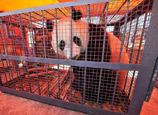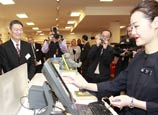
Joining Wan at the Shanghai event, Maria Van der Hoeven, executive director of the International Energy Agency, said that about 160,000 EVs were sold globally last year, just 0.02 percent of the entire car market.
Despite an ambitious projection by the IEA that 90 percent of light-duty vehicles will be powered by electric motors by 2050, Van der Hoeven added that immediate demands are unlikely to be met, due to supply shortage.
Various local governments in China have expressed an interest in supporting the electric vehicle industry, and have rolled out incentives to lure customers.
For example, the Shanghai municipal government offers a 40,000 yuan rebate on the purchase of a battery-powered car.
Buyers from Shanghai's Jiading district, which has positioned itself as an international EV pilot zone, can benefit from an additional cash rebate worth 15,000 yuan.
The program will last two years, and district head Ma Chunlei said she hopes it will result in the sale of 350 EVs.
Shanghai's new energy car market was worth 3.5 billion yuan in 2012, according to Vice-Mayor Weng Tiehui.
About 300 Roewe E50 vehicles, China's first indigenous purely electric super-mini car, have been ordered for private use, she noted.
Shanghai-based vehicle rental company eHi Car Service Co Ltd has also embraced electric vehicles - from June it will add 500 Roewe E50s to its 10,000-vehicle Shanghai fleet.

















 Learning to be a perfect lady proves fruitful
Learning to be a perfect lady proves fruitful


![]()
